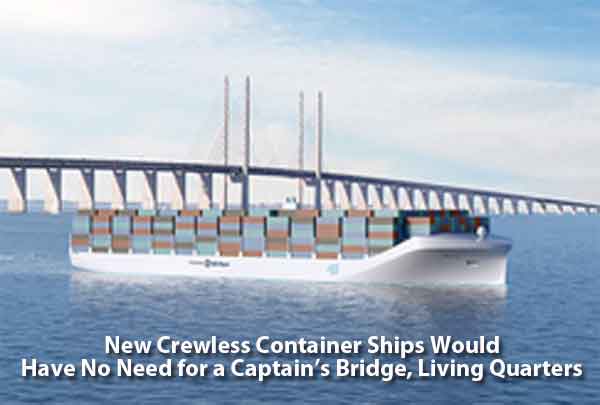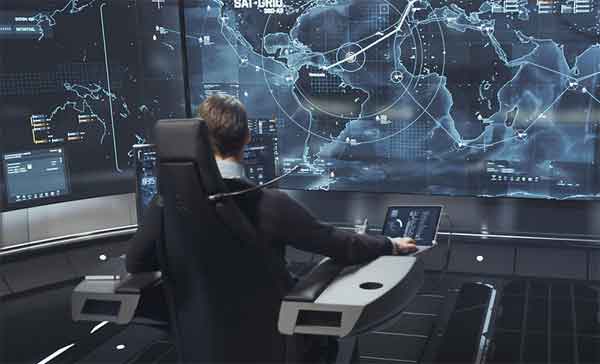SCDigest first reported on work being done by the Rolls-Royce shipping division to develop container ships that would be navigated by remote control back in 2014. (See Will We Soon See Drone Cargo and Container Ships?)
Now, the company has updated the market on its progress during a presentation at the Autonomous Ship Technology Symposium in Amsterdam and in a new white paper on the topic.
Supply Chain Digest Says... |
 |
| The Rolls-Royce white paper notes that autonomous ships may be vulnerable to piracy, as inadequate security would potentially mean hackers could commandeer the freighters. |
 |
What do you say? |
| Click here to send us your comments |
 |
| Click here to see reader feedback |
|
|
"The futuristic-looking vessels (see image below) can be monitored remotely by a "captain" stationed at a base anywhere around the world, said Oskar Levander, the company's VP of marine innovation, who added that he expects such ships to be sailing by the end of 2020.
"This is happening. It's not if, it's when. The technologies needed to make remote and autonomous ships a reality exist," Levander added. "We will see a remote-controlled ship in commercial use by the end of the decade."
Tests of a simulated autonomous ship control system are already underway in Finland, and trials of sensor arrays in different operating and climatic conditions are also being carried out, Levander said.
Rolls-Royce says the remotely-operated ships would be faster, more efficient, and cheaper to operate than current ships doing the same job - and the cheaper part certainly comes in part from operating with little or no crew, other than the remotely-stationed captain.
No crew also means there is no need for the captain's bridge and living quarters, providing additional space to put bulk cargo or containers.
According to the paper, such ships will be computer controlled with arrays of sensors that will include cameras, infrared systems, radar, lidar, microphones, sonar, and GPS. However, the tricky bit will be figuring out how to deal with all the bandwidth these require and whether they can operate in real time.

Rolls-Royce's efforts are connected to something called the Maritime Unmanned Navigation through Intelligence in Networks (MUNIN). The program is co-funded by the European Commissions and aims to develop and verify a concept for an autonomous ship, which is defined as a vessel primarily guided by automated on-board decision systems but controlled by a remote operator in a shore side control station.
(See More Below)
|
CATEGORY SPONSOR: SOFTEON |
|
|
| |
|
|
MUNIN is a consortium of eight partners that have the relevant scientific and industrial background. The group is studying the operational, technical and legal aspects in connection with the vision of an autonomous ship.
Its web site says that "Solutions for an autonomous bridge, an autonomous engine room, a shore side operation center and the communication architecture linking vessel and a shore operator will be developed and verified" as a result of the program.
Ships Would be Controlled by a Far Away Captain

There are issues to be dealt with, however, beyond questions around the sensor and control technologies cited above. The Rolls-Royce white paper notes that autonomous ships may be vulnerable to piracy, as inadequate security would potentially mean hackers could commandeer the freighters.
"In principle, anybody skillful and capable to attain access into the ICT [control] system could take control of the ship and change its operation according to hackers' objectives," the white paper states.
"This could mean simply some disruptive actions or maneuvers introduced for annoyance or demonstration, hijacking of the ship and cargo for ransom, but also powered groundings or collisions created on purpose to cause severe destruction."
The first fully autonomous or remotely controlled cargo ship is expected to set sail on the Baltic Sea, sailing the waters between countries such as Denmark, Finland, Germany, Poland, and Russia with bulk cargo such as grain.
Do you think we will see such remote controlled, crewless ships by 2020? Is this the way of the future? Let us know your thoughts at the Feedback section below.
Your Comments/Feedback
|